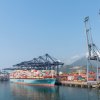- Date
- 23 June 2021
Container Chaos: Partial Closures at Chinese Port Yantian Leaves Shipping Industry in Disarray
Container Chaos: Partial Closures at Chinese Port Yantian Leaves Shipping Industry in Disarray
By Violet O’Gorman |
The Story
In recent weeks, there has been a severe backlog in various Chinese ports for container ships and other vessels. This is partially driven by the knock-on effects of a closure at Yantian Port from 25 May 2021 until 27 May 2021 (CNBC) due to several workers testing positive for Covid-19. The port, which is the third-largest terminal in the world, has now largely re-opened - but is only currently operating at 70% productivity (Financial Times). Global shipping firm Maersk warned its clients that delays at Yantian could continue for up to 16 days (CNN) – potentially making the disruption greater than that caused by the Suez canal blockage earlier this year.
In January 2021, limited container capacity at ports due to Covid-19 border closures led to delays and a huge increase in shipping costs globally, with the Suez canal blockage in March further compounding the issue. Renewed disruption caused by the partial closure of Yantian has had more knock-on effects for shipping companies, their clients and end-consumers. Over 40 container ships were stuck in open water outside the terminal (Maritime Professional) during the closure. This prompted some large carriers to “warn clients of delays, changes to vessel routes and destinations and spikes in fees” (CNN). This has in turn increased pressure at other Chinese ports such as Shekou and Chiwan.
What It Means For Businesses And Law Firms
The global shipping industry has been stretched to the maximum during the Covid-19 pandemic. With global lockdowns prompting an increase in online shopping, coupled with such incidents as described above, Pawan Joshi, executive vice president at E2open, notes that "there is no room left anymore for error or unexpected events — it is all squeezed out" (CNN). These events expose the present vulnerability of the global shipping industry to the impact of small local disruptions (Lloyds List) – something which is worrying to many international suppliers and manufacturers.
In particular, the upcoming month of August is for many businesses a peak shipping season - before the back-to-school rush and December holiday period. Some businesses, keen not to have their supply chain affected, have taken the situation into their own hands; Home Depot, a major exporter from Yantian, has reportedly chartered its own vessel “to start transporting products in mid-July in an effort to avoid maritime congestion that might hold up goods needed in time for the holidays” (CNBC). Other companies may follow suit, attempting to cut out the all-time high carrier costs, by chartering their own vessels to provide a more reliable supply chain. For this, they will likely need advice from law firms to negotiate in areas such as charterparty agreements, and contracts in new areas of the supply chain. Firms with extensive shipping practices will therefore likely see an increase in demand for their services during this time.
Image Credit: Mariusz Bugno / Shutterstock.com

